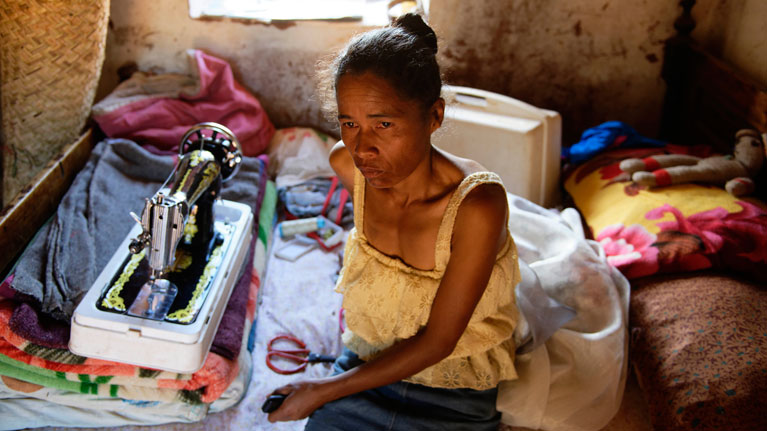While workplace violence can differ depending on a country’s development level, the most common forms occur everywhere. In the poorest countries, unacceptable practices are often exacerbated by poverty. ILO looked at the situation in Madagascar.
In the 1944 Philadelphia Declaration , the ILO proclaimed that “all human beings, irrespective of race, creed or sex, have the right to pursue both their material well-being and their spiritual development in conditions of freedom and dignity, of economic security and equal opportunity”.
Over 70 years later, it is on the basis of that statement that the decision was made to add violence and harassment against women and men in the world of work to the agenda of ILC 2018 .
Philadelphia was a long time ago and far away. But everyone we met in Antananarivo considered that Madagascar would do well to return to the principles enshrined in the Declaration, and step up the fight against violence. Of course, Madagascar is far from being the only place where such violence occurs. The country is better known for its friendly people and welcoming atmosphere, as well as its economic and touristic assets. But the prevailing poverty makes it all the more prone to this kind of abuse.
In Tanjombato, a poor neighbourhood of Antananarivo, the destitution is obvious. We turn off a deeply rutted dirt road half flooded by the rains, onto a narrow street bordered by shops housing all the informal trades. Popular Salegy beats played on the radio escape through the windows of people’s homes. The cries of children at play mingle with those of the farm animals many people raise to make ends meet.
Vololona Rasamoelison greets us in a courtyard. At 37, this mother of two is living precariously even though she has 15 years of experience as a machine operator in the textile industry. She tells us her story.
For two years, Rasamoelison had back-to-back temporary contracts in an export processing zone (EPZ), and worked to her employer’s satisfaction. To earn her monthly salary of 300,000 ariary (about US$90), she would get up at 4.30 a.m. for a workday that ran from 6 a.m. to around 6.30 p.m. Because of the huge traffic jams that clog Antanarivo at rush hour, she was never home before 8. To make matters worse, her foreman – taking advantage of a labour glut resulting from the country’s high unemployment rate – demanded a “toll” (in reality, a bribe) of 500 ariary a day.
“At first I accepted, but then I thought, this is unfair and I stopped paying,” she says.
The consequences weren’t long in coming. A few days later, when she arrived at the factory, she saw that her name had been added to the list of “nominees”, i.e. those whose contracts would not be renewed.
“So I found myself without a job because I didn’t want to pay to have a job. But why should I pay to have the right to work? It’s unfair. We have to speak out about these practices,” she says indignantly.
When we asked her why she had not contacted the company’s trade union representative, she replied that he was aware of the situation but was himself afraid to take action.
Rasamoelison, who is separated from her alcoholic and abusive husband, found herself unemployed for several months. Fortunately, it was at that time that she met members of Pastorale du Monde Ouvrier (PMO), a charitable association working with the ILO as part of a project funded by France and aimed at integrating women victims of violence. Thanks to the partnership, about 100 women from the Antananarivo area received psychological support and three months of training in trades such as sewing, cooking, hairstyling and computer technology, enabling them to be more financially independent.
“Thanks to the ILO project, I’ve been able to open a small pastry business. People in the neighbourhood order cakes and madeleines that I bake at home using the oven and kitchen equipment contributed by the project.” Her training also enabled Rasamoelison to find work in an industrial bakery.
A few streets away, we meet with a woman we’ll call Vola. She asked to remain anonymous, a sign that denouncing violence in the workplace is still a delicate business, especially when it is about sexual harassment.
Vola worked for seven years as a waitress in an Antananarivo hotel. Everything was going well until a well-known local resident, a good customer of the hotel, started making repeated and insistent passes at her every time he saw her. When she turned down his advances, he threatened to speak to her boss. One day, exasperated, the customer having just made another pass at her while seated at a table in the restaurant, she confided in tears to the head waiter. Instead of listening to her, the head waiter sent her back into the room to serve the customer’s meal. The customer, furious, threw the plate to the floor and started to insult her in public.
“The next day she was called into the director’s office. “He listened to my story, but instead of going to talk to the man, he explained that this was an important customer. In order to avoid any other incidents, he told me to stop working as a waitress and instead go work in the bar – where I would be even more exposed to proposals of this kind,” she recalls.
Vola has also benefitted from the ILO project and has since turned the page (the incidents took place a few years ago), but she stresses that urgent action is needed. “These people who harass us and violate our basic rights at work have to be denounced. I was going to the hotel to work as a waitress, not as a prostitute. Money shouldn’t be able to buy everything.”
Hanitra Razakaboana has heard of many cases like that of “Vola”. As president of the Malagasy union of labour inspectors, she struggles every day to ensure respect for the labour code. As she explains, it’s a tough job, because inspectors are themselves often subject to verbal intimidation and even death threats.
Razakaboana told us that harassment is not clearly defined in the labour code. She confirmed that it is an existing practice for foremen to ask for bribes in exchange for jobs and that the employers are not always aware that this is happening. One solution, she said, would be to give labour inspectors the material means of applying the law. Her services work on the basis of anonymous denunciations and, despite that, she acknowledged that in some cases, especially in the export-processing zones, union representatives themselves fear they’ll lose their jobs.
Asked whether she also received complaints from men, she explained that men were also victims of violence in the workplace, especially psychological harassment, which can be difficult to prove in the case of verbal attacks or gradual sidelining.
Sometimes, however, justice can be done, especially if several employees unite their efforts. Razakaboana told us about the surprise visit she had paid a few days before our interview to a company in the capital, after several employees alleged that they had been sexually harassed by a company executive. The allegations were backed up by audio recordings, and the executive was fired by the company head.
Employers, for their part, do not deny that the problem exists and clearly state their willingness to fight violence in the workplace.
“It’s also bad for our companies if an employee suffers violence or harassment in the workplace, not only from the point of view of morale, but because the employee will no longer perform well and ultimately it’s the bottom line that’s affected,” says Hanitra Ratsirahonana, president of the Social Commission of the Madagascar Chamber of Commerce
Ratsirahonana also wanted to highlight an issue that is very real but draws little attention in developing countries: psychological violence and phenomena like “burn out.” A depressive state linked to the professional environment, “burn out” occurs often in Madagascar because there is pressure to align performance to the standards of multinationals, even though the local context does not necessarily allow this. This has many consequences, especially on strained labour relations, leading to psychological violence and constant stress.
She called for social security reform, notably to strengthen benefits for occupational accidents, and for labour inspectors to be given the resources they need to ensure compliance with the law.
We mentioned cases of sexual harassment. According to Ratsirahonana, these are particularly difficult to uncover because of the cultural context in Madagascar, where sexual matters are never talked about in public, much less at work.
Labour unions spoke of sexual and psychological harassment, as well as physical violence, notably against domestic workers, and admitted unions sometimes face constraints in export-processing zones. They also say that insufficient funds are allocated for labour inspections, and decry corruption and the difficulty of getting a case heard in court – those cases that are detected are often settled through informal arrangements.
Rémi Botoudi, coordinator of the Madagascar Labour Conference (Conférence des Travailleurs de Madagascar, or CTM), said that, to address these issues more effectively, a mass campaign was needed to make workers aware of their rights and that corruption has to be fought with determination, while protecting the rights of trade union representatives. Drawing on his many years of trade union work, he reminded us of this local saying: “You can’t strike an egg against a rock.”
His colleague in the CTM, Lalao Rasoamananoro, said the issues are particularly difficult in the case of people with temporary contracts, citing the example of women who are told they’ll be out of a job if they become pregnant.
For the two trade unionists, the growing automation of Madagascar’s factories should also be considered a form of psychological violence at work. According to them, nothing is being done to introduce training activities enabling workers to learn another occupation and to help them find a job. Employers acknowledge the problem, but say the joint occupational training fund to be established in 2018 should soften the blow, as companies will be obliged to contribute to the fund.
One act of violence can mask another. Witness the story of Louisette Fanjamalala, another beneficiary of the ILO project, whom we met in the modest home she rents in Soavina, an industrial suburb of the capital.
At 42, abandoned by her boyfriend, Fanjamalala is raising her two children aged 18 and 13, as well as two orphans aged 13 and 12. She explained that for years she worked on six-month contracts in companies located in a nearby export-processing zone, often alternating with a period of unemployment of the same duration. At one point she had to leave a job because the company refused to let her nurse her child during working hours. For some time, now, however, she has faced another form of violence at work: age discrimination. She is finding it harder and harder to find work, leading her to despair and fear for the future.
“No one wants to hire me anymore because, at 42, they think I’m too told,” she confided tearfully. “Often they won’t even interview me when I apply for a job. And yet I’m qualified, I have experience and I work well. Why am I being discriminated against?”
“In Madagascar, it is not uncommon for fundamental rights to be flouted, even though there is a legislative framework. The result is multiple forms of violence, including more stress and physical and psychological violence. The whole thing is exacerbated by a lack of social dialogue that all too often leads to a breakdown of trust between employers, workers and the government,” commented Christian Ntsay, former Director of the ILO Country Office in Antananarivo.
Ntsay suggested several measures to help reduce violence in the workplace. “A country like Madagascar would benefit from ensuring respect for the fundamental conventions it has already signed, from managing the modernization of its companies and from reasserting the place of social dialogue,” he concluded







